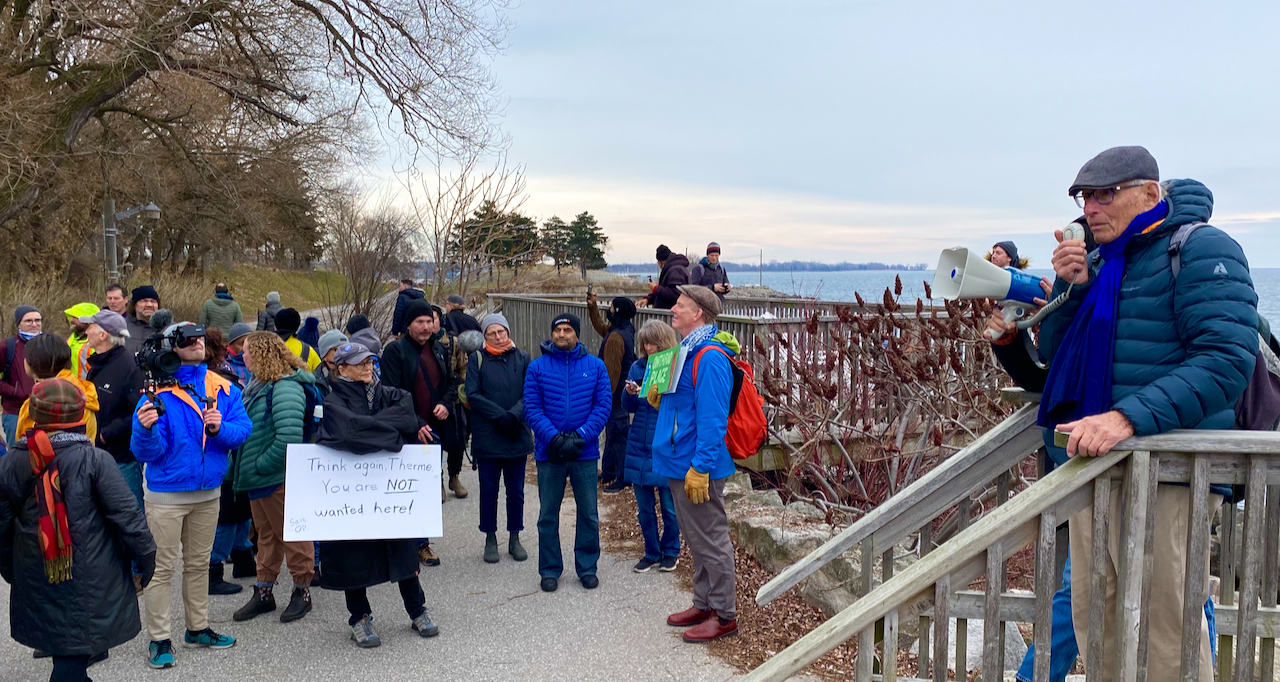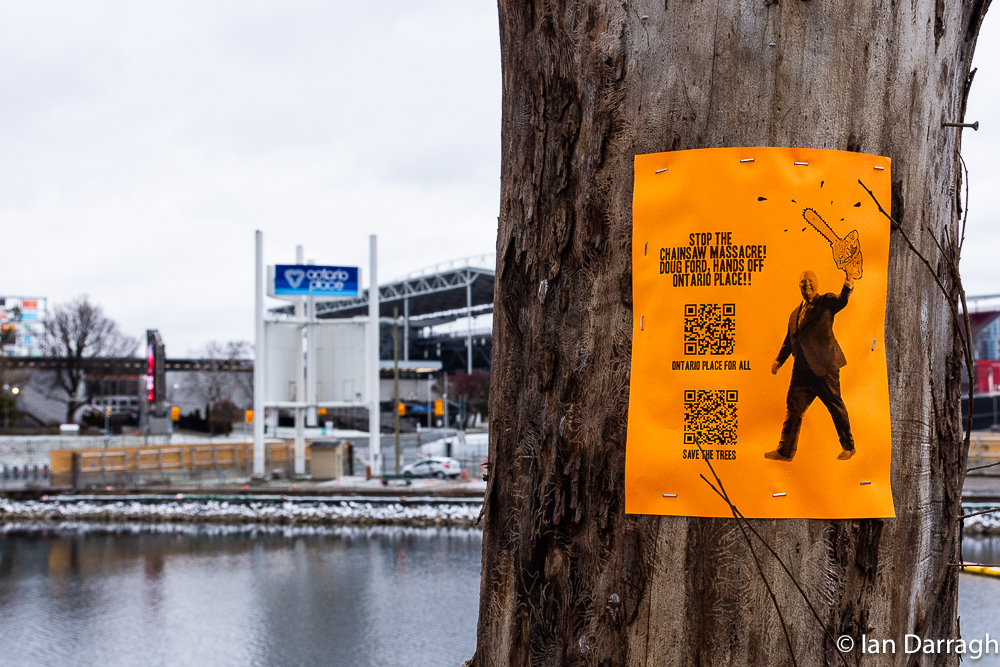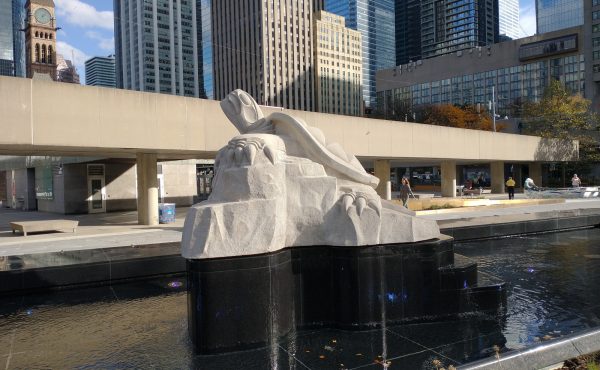The Ford government has used its majority at Queen’s Park to pass two bills to fast-track the redevelopment of Ontario Place. The New Deal for Toronto Act, 2023 (Bill 154), which includes the Rebuilding Ontario Place Act, was passed in the legislature in three days without any public consultation or committee review. The acts give the Ontario Minister of Infrastructure sweeping powers to direct construction at Ontario Place, and exempts the project from the Ontario Planning Act, the Ontario Environmental Assessment Act, and the Ontario Heritage Act. It also forces the City of Toronto to sell the 16 acres it owns at Ontario Place to the province, and exempts Ontario Place from City of Toronto noise bylaws. Bill 154 also contains blanket provisions designed to shield the Ontario government from any claims for damages related to the redevelopment of Ontario Place: “no costs, compensation or damages, including for loss of revenues or loss of profit, are owing or payable to any person and no remedy, including but not limited to a remedy in contract, restitution, tort, misfeasance, bad faith, trust or fiduciary obligation, any equitable remedy or any remedy under any statute …”
I asked the Ontario Government why this broad shield from any legal action is included in Bill 154, but did not receive any comment.
A coalition of community groups called Ontario Place Protectors filed a request on February 20, 2024 in the Ontario Superior Court of Justice for a judicial review of The New Deal for Toronto Act on the grounds that it violates sections 52, 91, 92 and 96 of the Canadian Constitution Act, 1982.

“The New Deal for Toronto Act is unprecedented,” said Eric K. Gillespie, the lawyer representing Ontario Place Protectors.
“We have been unable to identify another government going this far to protect itself from any potential wrongful acts,” said Gillespie. “In one piece of legislation they have removed decades of protections that were carefully put in place for land-use planning in Ontario. If the Planning Act, Environmental Protection Act, and Heritage Act can be exempted from applying to Ontario Place, the obvious question is: what’s next? The government could simply apply the same process to building new airports, highways, and nuclear power plants. And they will be completely protected from anybody doing anything about it.”

“Whatever the courts decide, the New Deal for Toronto Act is an unethical law,” said Chris Glover, MPP for Spadina-Fort York, whose electoral district includes Ontario Place. Glover is the NDP critic for democratic reform.
“The Act allows the government to break provincial laws,” said Glover. “They explicitly say they’re overriding the Environmental Bill of Rights, the Environmental Protection Act, the Heritage Act, and Toronto bylaws. But the more frightening part is that they are exempting themselves from court actions. No ministers, former or current crown agents, or current or former employees can be taken to court for anything that they’ve done or will do (it’s retroactive) that would constitute breach of faith, breach of contract, misfeasance, or acting in bad faith. So they’ve basically said, ‘We may have broken the law, but you can’t take us to court for that.’ The question people need to be asking is, so what acts of breach of faith, breach of contract, or misfeasance have they done, or are planning on doing, that they need legal protection? And that’s scary because if they’ve committed those acts, they need to be held accountable and the courts are the way to do that. And I salute the Ontario Place Protectors for what they’re doing because members of the government cannot be above the law.”

“I think it’s an admission of guilt that they’re trying to exempt themselves from judicial review from breaking the law and this is a very dangerous step for our democracy,” added Glover.
“The title of the New Deal for Toronto Act is a diversion. The first section of the Act gives the Ontario government the authority to negotiate with the City of Toronto. The Government didn’t need a bill to enter into negotiations with the City of Toronto. They were already doing that. This was a diversion from the more sinister part of this bill which is the attack on our democratic rights and the right of Ontarians to take the government to court when they break the law.”
Before Bill 154 was passed, the advocacy group Ontario Place for All filed a lawsuit requesting that the Province undertake an environmental impact assessment of its plans to build a mega-spa on the West Island of Ontario Place. The Province of Ontario has filed a motion to quash that request for an environmental assessment, citing Bill 154, which exempts Ontario Place from the Environmental Protection Act.
Ontario Place has the highest level of protection under the Ontario Heritage Act. The entire site is designated as a provincial heritage property of provincial significance — the highest category, reserved for heritage sites in need of the most stringent protection.

When Ontario Place was protected under the Ontario Heritage Act in 2014, the Statement of Heritage Value highlighted that “Ontario Place featured innovative new landforms and structures built on Toronto’s waterfront, reshaping the relationship between the urban landscape and Lake Ontario. Ontario Place, a cultural heritage landscape, remains a rare and intact Modernist expression of integrated architecture, engineering and landscape that honours and incorporates the natural setting of Lake Ontario.”
The Ontario Government has recently removed this Statement of Heritage Value from its website, which may be illegal under the Ontario Heritage Act. (The Ontario Government could have initiated a process to de-list Ontario Place as a heritage site, but so far hasn’t taken this more transparent, but controversial, step.)
“One of the things the heritage guidelines say is before you make any decision about a site, you need to prepare a strategic conservation plan to guide any alterations,” said Bill Greaves of Architectural Conservancy Ontario, a non-profit that advocates for the conservation and reuse of structures and landscapes of architectural, historic, and cultural significance.
“Well, they brought in all their partners, signed the contracts, defined the (Ontario Place redevelopment) project and then started the strategic conservation plan. So right off the bat, the entire process was poisoned and illegitimate from the start. This is not what responsible stewards are supposed to do under the Heritage Act. And then they used their strategic conservation plan to justify what they were planning to do.”
“The Heritage Act’s standards and guidelines say demolition must be used as a last resort. That’s not what they’re doing. They are demolishing the entire West Island. I don’t think anybody could say they’re using demolition as a last resort with this project,” said Greaves.
“The Ontario Government felt it necessary to exempt Ontario Place from the Heritage Act in Bill 154 because their proposed plans (and the process by which they arrived at them) clearly violate the Act’s requirements. They also violate internationally accepted heritage conservation practices.”
Why is the Ford government afraid of an environmental impact assessment on the West Island of Ontario Place? Why exempt Ontario Place from the Ontario Heritage Act? Is the Ford government planning to modify or demolish the pods and Cinesphere at Ontario Place eventually? That could be one reason for specifically exempting the redevelopment of Ontario Place from the Heritage Act. I asked the Ontario Government these questions but did not receive a response.
The penalties for altering or demolishing a designated heritage property protected under the Ontario Heritage Act without authorization are substantial: a fine of up to $1 million, and up to one year in prison. That may explain why Bill 154 goes to such great lengths to shield ministers, agents of the crown, and public servants from any legal penalties arising from their work on the redevelopment of Ontario Place.
Glover also criticized the Ontario Government for spending $2 million in the Fall of 2023 to promote awareness of its plans for Ontario Place before any shovels were in the ground. In contrast, the Auditor General found that the Ontario government spent $1.1 million on advertising promoting awareness of cancer screening and only $280,000 promoting cervical cancer screening in 2022-2023. Government advertising is supposed to promote awareness of government services and programs for all citizens, not promote partisan policy agendas.
The Auditor General of Ontario is currently undertaking a value-for-money audit of the Ontario Place redevelopment project, and specifically the 95-year lease signed with the Therme Group of Austria. The audit is due to be released in December 2024.
Photos by Ian Darragh






One comment
The destruction of Ontario Place and the moving/destruction of the Ontario Science Centre from its valued lands (to be developed by a Ford developer buddy I’m sure) by the Ford govt is both engraging and heartbreaking. That Ontario’s laws and Acts can be destroyed in one fell swoop by this OCP Bill leaves one in fear for not only for our Heritage Sites but democracy in Ontario.